Campaign Chronicles: The Peoples’ Primary

He’s a left-wing Catholic who founded an interfaith coalition. She’s an environmental activist who was reportedly brought to tears when she heard about the melting permafrost in Siberia. Just a couple of crazy kids who got together after the covid lockdown and decided to put on a primary.
This was the origin of the primaire populaire, literally popular primary, whose mission it was to unite the fragments of the Left behind a single candidate. That wasn’t all there was to it, of course: money (to develop the app, to advertise) had to come from somewhere, and they never did get around to revealing their sponsor. (The website simply says “generous donors.”) A number of celebrities, including Juliette Binoche, signed a statement in support. The media had to buy in, and they did: the faces of Mathilde Imer (the environmentalist) and Samuel Grzybowski (the left-wing Catholic) became familiar in newspapers, magazines, and tv.
And their mission was based on a genuine problem, as everyone agreed: there were (and as I write, are) seven presidential candidates running on the Left:
Jean-Luc Mélenchon, of La France Insoumise, leading a Left coalition, and highest in the polls;
Anne Hidalgo, of the Socialist Party, which has become a shadow of the powerful group that brought Mitterand to power twice;
Yannick Jadot, of the EELV (Green) party, the winner of their primary;
Fabien Roussel, of the PCF (Communist Party);
Nathalie Artaud, of the Trotskyist Communist Union, usually called Lutte Ouvrière (Workers’ Struggle);
Jean Lasalle, of Résistons!, his own micro-party, on the Left;
Philippe Poutou, for the New Anticapitalist Party; he also seems to be a Trotskyist, at least partly.
The two entrepreneurs first ran a sort of primary, asking those who signed up to the app to nominate their preferred candidate. Christiane Taubira overwhelmingly came in first. Why? Unclear.

Taubira, age 70, once a deputy from Guyane française, has a distinguished record as a member of the Left (usually the Parti Radical de Gauche, a center-left party); she often served with the socialists in power, most notably as Garde des Sceaux, or Minister of Justice, in François Hollande’s cabinet. She was responsible for mariage pour tous, the same-sex marriage law passed in 2013, and for the creation of the Parquet national financier (PNF), a specialized court dealing in financial improprieties–the court which, as it happened, investigated Les Républicains presidential candidate François Fillon in 2017, thus tanking his chances.
Taubira had been largely inactive in recent years, but soon made it clear that she was interested in the popular primary, and that if she came in first, she would accept the responsibility and the “risk,” as she put it, of uniting the Left.
The other six candidates were interesting choices, and included Anne Hidalgo, Yannick Jadot, and Jean-Luc Mélenchon. All three refused to participate, but were nevertheless on the ballot against their will. Mélenchon and his people were downright insulting about the effort, calling it a “joke”; he suggested that they simply rally behind him, since he was the highest of those on the Left in the polls, and steadily polled in the double digits, unlike the others.
Jadot’s campaign manager made it clear that, having won the EELV primary, he did not have any interest in going through another one. The manager even offered the young organizers 150,000 euros to pay off the debts of their enterprise if they would call it off, an attempt that he fully acknowledged and that–despite Mediapart’s best efforts–went nowhere as a scandal.
The last three candidates on the ballot were all labeled as “various Left,” or Divers gauche: Pierre Larrouturou; Charlotte Marchandise; Anna Agueb-Porterie.
????
Pierre Larrouturou, the best known, is currently a member of the European Parliament and founder of his own leftist microparty, Nouvelle Donne (New Deal). He believes in a form of UBI, or Universal Basic Income, from the age of 18 on
Charlotte Marchandise is a public health expert and city council member of Rennes.
Anna Agueb-Porterie, age 24, is described as a social activist @Emancipationcollective.
So the “field” amounted to three candidates who bluntly said they did not wish to run, three that most had never heard of, and one–Taubira–who was clearly hoping to use the popular primary as a launchpad into the race.
The manner of voting was also new and unusual. Instead of choosing one individual, the voters were to rank all seven, choosing among the following categories: excellent; très bien; bien; assez (rather) bien; passable, or acceptable; insuffisant (insufficient); à rejeter (to be rejected, or excluded).
The results were shown as a Likert scale, though an unbalanced one; Likert scales often have five categories, with a central “neutral” value and two each in the negative and positive sides (strongly agree, agree, neither agree nor disagree, disagree, strongly disagree, is one of the most common set of ratings).
In this case there were seven ratings, with four in the positive column, one (passable) in the neutral category (sort of) and two in the negative category. After the online voting from January 27 to January 30, 2022, they announced that Christiane Taubira had won, followed by Yannick Jadot, with Jean-Luc Mélenchon in third; Anne Hidalgo came in fifth, after Larrouturou.
Taubira immediately accepted the responsibility of the nomination, announcing that she would attempt a “rassemblement” of all the candidates. She reached out to them. Jadot, Mélenchon, and Hidalgo all refused her. Anna Agueb-Porterie, who came in last as “insufficient,” announced that she was going to support Mélenchon. And so she did.
The popular primary executive committee, apparently regarding its work as done, dropped out of sight, making no apparent efforts to support Taubira.
Worse still, they had created Socle commun, a “party platform” on which the winner was supposed to run. It was not a program of simple statements of principle (“a more just society”), though there were a few of those: “reduce the technocratic elites,” for example (p. 7). But much of it required quite specific “ruptures,” including the end of the Fifth Republic and the establishment of the Sixth through a “citizens’ convention,” composed of 150 citizens drawn at random (the structure and model was 2019’s Citzens’ Climate Convention, p. 7).
Taubira, rather more moderate than this, hired an advisor to draft her own platform.
Television reporters repeatedly asked Taubira why she was adding to the problem by becoming the eighth candidate, a question which she had difficulty answering, but which quickly became moot when she was able to get only 267 of the necessary parrainages, or endorsements, needed to run.
The executive committee met in closed session, and decided to endorse Jean-Luc Mélenchon, skipping over the second-place Green finisher, Yannick Jadot. The environmentalist co-founder, Mathilde Imer, quit the group the next day.
Others were also angry over the apparently arbitrary choice of Mélenchon over Jadot, to the point that the group apologized to its voters. Mélenchon remained contemptuous of the endeavor.
On March 26, co-founder Samuel Gryzbowski announced that he, too, was leaving the group and joining Victoire populaire, in support of Mélenchon because his primary goal was the victory of the Left. “We believed . . . that this victory was impossible without a union of the Left. . . . Today, I’ve changed my mind. I think that we can win without a union of the parties. It’s possible with [Mélenchon’s] Union populaire.
Mélenchon had been telling him that all along.
=====================================================
Header image by Shutterstock. Simply because the photo makes me happy.
https://drive.google.com/file/d/1aCi-qRXs8CN8bn4GjJHlD9S2lWMwHvYE/view Socle commun et autres idées en débat.
Selected sources
Hadrien Mathoux, “Primaire populaire/sondage exclusi´f: un voteétaill pour Taubira et la gauche modérée,” Marianne, January 28, 2022.https://www.marianne.net/politique/gauche/primaire-populaire-sondage-exclusif-un-vote-taille-pour-taubira-et-la-gauche-moderee
Lou Fritel, “Primaire populaire: mais qu’est-ce que le scrutin par ‘jugement majoritaire’?” Marianne, January 27, 2022.https://www.marianne.net/politique/gauche/primaire-populaire-mais-quest-ce-que-le-scrutin-par-jugement-majoritaire
Rachid Laïreche, “La primaire populaire qui roule pour JLM: quelle rigolade!” Libération, March 6, 2022. https://www.liberation.fr/politique/la-primaire-populaire-qui-roule-pour-jean-luc-melenchon-quelle-rigolade-20220306_2Q7GSC7ZOFCKRCQMJS33HP7KVE/?redirected=1
Victor Boiteau, “Mathilde Imer et Samuel Grzybowski, leur instant primaire,” Libération, January 25, 2022.https://www.liberation.fr/politique/mathilde-imer-et-samuel-grzybowski-leur-instant-primaire-20220125_ERGY3W4S6VFG5EHVMW4MGTEBRA/
Mathilde Goanec and Pauline Graulle, “Les Verts, la gauche et la Primaire populaire: des pressions et 150,000 euros sur la table,” Mediapart, February 11, 2022. https://www.mediapart.fr/journal/france/110222/les-verts-la-gauche-et-la-primaire-populaire-des-pressions-et-150-000-euros-sur-la-table?utm_source=20220211&utm_medium=email&utm_campaign=QUOTIDIENNE&utm_content=&utm_term=&xtor=EREC-83-%5BQUOTIDIENNE%5D-20220211&M_BT=1432258661604
“Christiane Taubira annonce qu’elle sera candidate à l’élection présidentielle si elle remporte la Primaire populaire à la fin de janvier,” Le Monde, January 9, 2022. https://www.lemonde.fr/election-presidentielle-2022/article/2022/01/09/christiane-taubira-annonce-qu-elle-sera-candidate-a-l-election-presidentielle-si-elle-remporte-la-primaire-populaire-fin-janvier_6108761_6059010.html